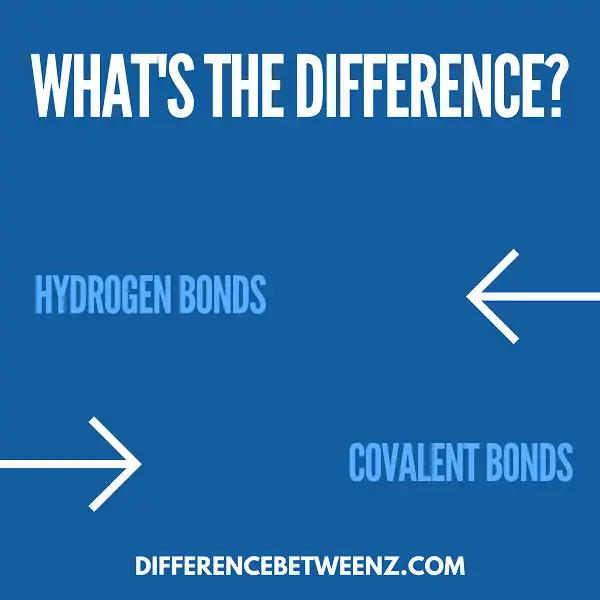What are the differences between hydrogen bonds and covalent bonds? Hydrogen bonds are weaker than covalent bonds, but they can form more easily because of the availability of atoms with lone pairs of electrons. In contrast, covalent bonds involve the sharing of pairs of electrons between atoms, so they are stronger but require more energy to form. Hydrogen bonds play an important role in many biological processes, while covalent bonds are responsible for the structure and stability of most molecules.
What are Hydrogen Bonds?
Hydrogen bonds are one of the most important intermolecular forces in chemistry. Hydrogen bonds occur when a hydrogen atom is attracted to a highly electronegative atom, such as oxygen or nitrogen. The resulting bond is incredibly strong, and it is responsible for many of the properties of water.
Hydrogen bonds also play an important role in the structure of DNA. The double helix would not be possible without these strong bonds holding the strands together. Hydrogen bonds are also involved in the formation of protein structures.
In short, hydrogen bonds are essential to life as we know it. Without them, water would not be a liquid at room temperature, DNA would not exist, and proteins would not be able to perform their functions. In other words, hydrogen bonds are vital to life on Earth.
What are Covalent Bonds?
Covalent bonds are chemical bonds that occur when two atoms share electrons. The shared electrons form a bond between the atoms, resulting in a stable compound. Covalent bonds are strong, meaning that they are difficult to break. However, covalent bonds can be broken if enough energy is applied to them. The strength of a covalent bond depends on the size of the atoms involved and the number of shared electrons. Covalent bonds are found in a variety of molecules, including water, DNA, and proteins. Without covalent bonds, these molecules would not be able to form, and life as we know it would not be possible.
Difference between Hydrogen Bonds and Covalent Bonds
Hydrogen bonds and covalent bonds are two types of chemical bonds that differ in their strength and formation. Hydrogen bonds are weaker than covalent bonds and are formed when a hydrogen atom is attracted to a more electronegative atom, such as oxygen or nitrogen. Covalent bonds, on the other hand, are formed when two atoms share electrons. Because they involve the sharing of electrons, covalent bonds are much stronger than hydrogen bonds. Hydrogen bonds can be found in water molecules, while covalent bonds can be found in molecules like carbon dioxide.
Conclusion
In order to make sure you are using the right kind of bond in your research, it’s important to understand the difference between hydrogen bonds and covalent bonds. Hydrogen bonds are weaker than covalent bonds but they can still be very helpful in holding molecules together. When it comes to conducting research in a laboratory setting, always use covalent bonding unless you have specific reasons for using hydrogen bonding instead.


